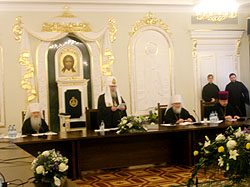Address by His Holiness Patriarch Alexy II of Moscow and All Russia to the meeting of religious leaders of Azerbaijan, Armenia, Georgia and Russia Moscow, St. Daniel’s Monastery, November 26, 2003
2.12.2003 · English, Архив 2003
ADDRESS BY HIS HOLINESS PATRIARCH ALEXY II OF MOSCOW AND ALL RUSSIA TO THE MEETING OF RELIGIOUS LEADERS OF AZERBAIJAN, ARMENIA, GEORGIA AND RUSSIA
Moscow, St. Daniel’s Monastery, November 26, 2003
Your Holiness and Beatitude Iliya II, Catholicos-Patriarch of All Georgia, Your Holiness Garegin II, Supreme Patriarch and Catholicos of All Armenians, Venerable Sheikh-ul-Islam Allahshuqur Pasha-zade, Chairman of the Supreme Religious Council of the Caucasus Peoples and spiritual leader of the Muslims in Azerbaijan, Your Eminencies and Graces, Honorable Mr. Ambassador, Dear Brothers:
By the grace of the Most High Creator, we have gathered here, at St. Daniel’s Monastery, for a regular peacemaking meeting of the spiritual leaders of the four nations. I wholeheartedly thank the Venerable Sheikh-ul-Islam Allahshuqur Pasha-zade, His Holiness and Beatitude Catholicos-Patriarch Iliya II and His Holiness Supreme Patriarch and Catholicos Garegin II for having come to Moscow for this meeting. We are bound by long-standing friendship and mutually beneficial cooperation. It is gratifying to see that the tripartite meetings for a settlement in the Caucasus, which have been held since 1989, have acquired a new, quadripartite, format. We welcome the entry of the Georgina Orthodox Church into our polyalogue, as we all will benefit from her experience of successful work in the hard situation of the post-Soviet period. We all pray for peace for the Georgian people and sincerely wish spiritual and physical strength to their spiritual leader in such a difficult time.
As is well known, religious life and the work of clergy and laity can make a beneficial impact on the situations in our respective countries. That is why it is so important that we as religious leaders should together call our flocks to peace and accord, seeking to formulate a common position on the situation in the Caucasus. True, the peoples in the region are still divided by enmity and distrust. However, aware of all this, we should still seek to speak to our faithful as well as politicians and society with one voice. I should think, our meeting could result in adopting a message defining the basic principles of a peaceful and equitable settlement of conflicts in the Caucasus.
Contrary to radicals and extremists of all kinds who seek to forcibly redistribute lands and powers, we can firmly speak out for a settlement of the existing problems only by peaceful and legitimate means. At the same time, it is clear that many of these problems have been caused by the infringement of the rights of ethnic minorities. The Caucasus has long been inhabited by a variety of peoples, and the states of the region have always been famous for the culture of good-neighborliness. Its restoration is what is needed today in the first place. In particular, steps should be made to integrate ethnic minorities in all the spheres of public life, to ensure the freedom of faith and religious work for them and to give them an opportunity for developing their own culture and language. Refugees and asylum seekers who wish to return to their homes should not be forgotten.
Inter-ethnic enmity should be resolutely opposed. We should once again remind the powers that be, as well as politicians, public figures, cultural workers and the mass media that no one can be elevated or humiliated on ethnic or confessional grounds.
I believe, we should appeal to the faithful of our religions with words of peace calling them to prayers, fellowship and joint efforts. Our pastoral duty is to warn them against participation in the works of hatred and enmity, which inevitably end in suffering for themselves.
Today many expect from religious communities in the Caucasus an active involvement in the settlement of conflicts and establishment of normal life. People in power and in society hope that our peace efforts will help heal wounds in people’s souls, thus preparing a ground for a comprehensive peace settlement.
I am confident that we are able to justify these expectations. I once again welcome to Moscow His Holiness the Supreme Patriarch and Catholicos Garegin II, Sheikh-ul-Islam Allahshuqur Pasha-zade and His Holiness and Beatitude Catholicos-Patriarch Iliya II. Will you, dear brothers, tell us about your vision of the problems we have raised.
See also:

